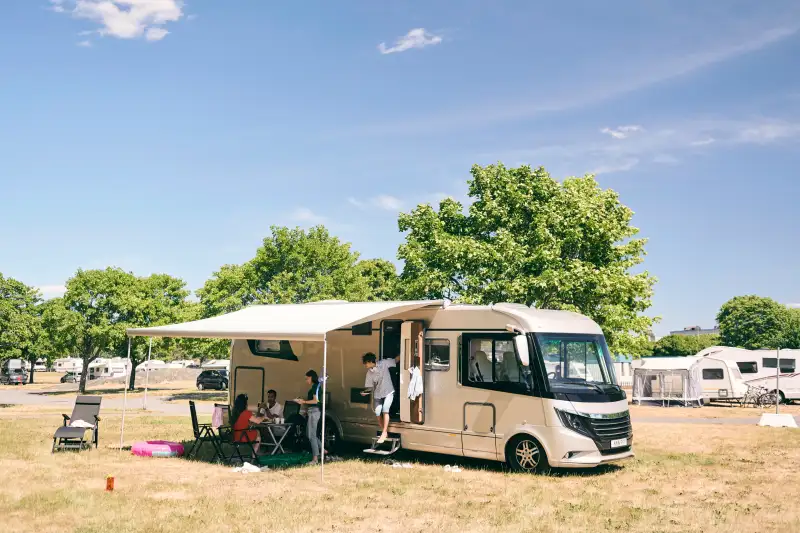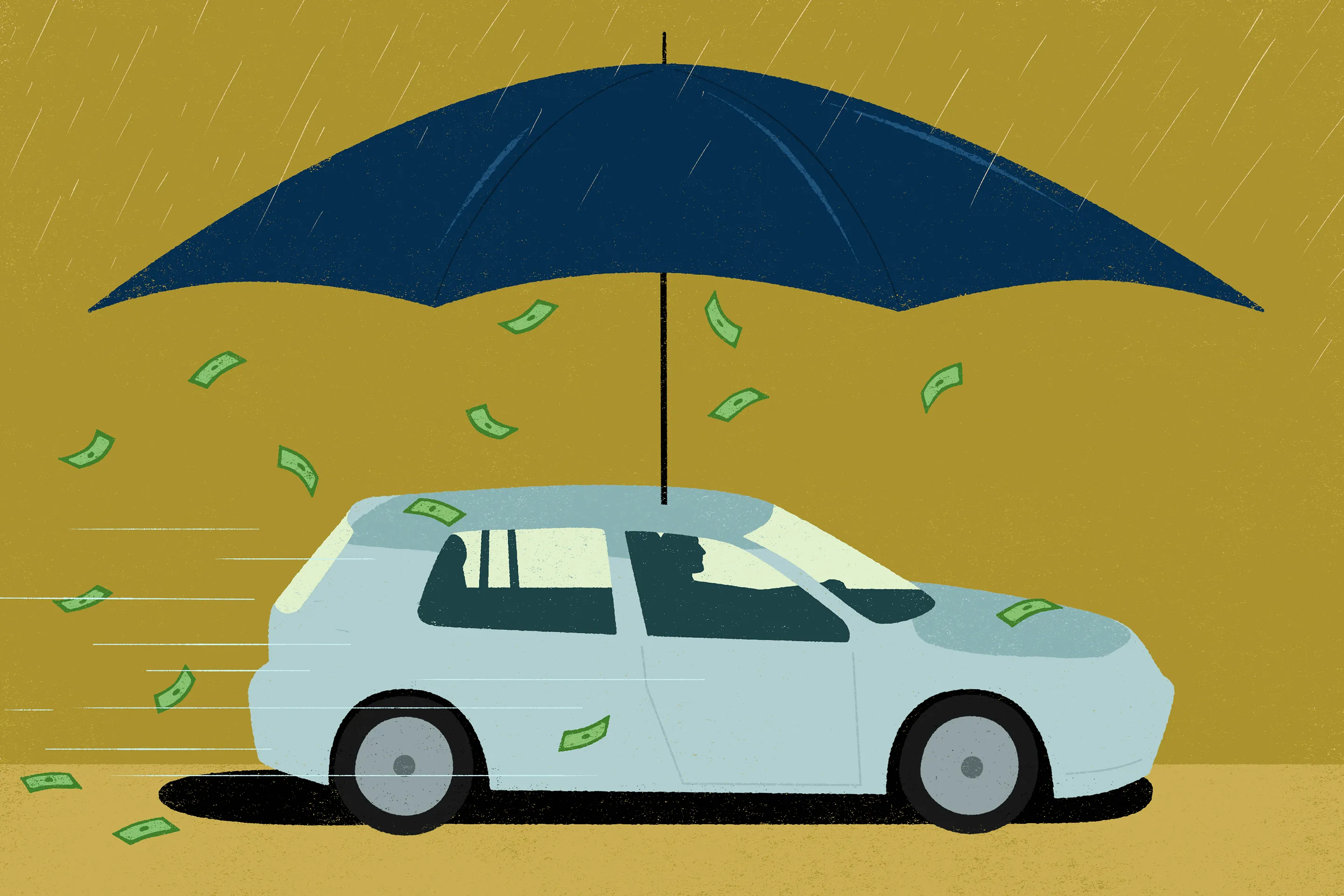RV Rentals Are Hot. Follow These 5 Tips to Find the Right Insurance — Without Overpaying

Renting a recreational vehicle is the vacation rage of summer 2020; interest in RV rentals is nearly double the levels of 2019, according to Google's search data. But before you get the keys to one of these hotel-rooms-on-wheels, be aware that insuring a rental RV can be a lot pricier than insuring a rental car.
Two main factors lend special appeal to RV rentals this year. They’re coronavirus-friendly, offering all-in-one socially distant travel and accommodations. And they’re cheaper than usual to operate, thanks to the lowest gas prices in more than a decade, according to Trading Economics. (Gas prices really count for RVs, since they travel as little as 4 miles on a gallon of gas, according to rental site RVShare.)
But the high cost of driving an RV doesn’t end with pricey fill-ups and rental costs (which range from $100 to more than $400 a day, according to a survey by the Wandering RV website.) Insurance can easily add $20 per day to your rental costs if you find you aren't covered by your car insurance at home. And some insurance-savings strategies for rental cars don’t work for rental RVs. Here’s what you need to know about insuring your mobile home-away-from-home.
Your Car Insurance Might Cover You
Car renters benefit from their auto insurer extending much the same coverage to the cars they rent as to the vehicles they own. While not all companies allow such coverage for an RV, it’s worth a call to your insurance company about whether yours does.
Even companies that allow it may not do so in all states or for especially long rentals — say, of more than a month. Companies that generally extend coverage include USAA, according to a spokesperson, and State Farm, which allows coverage of an RV in most states under your auto insurance for up to 30 days with no advance notice required, according to public affairs senior specialist Anna Bryant.
Check, though, that your collision coverage will extend to the full value of the RV, which will very likely be more than the value of your own car. State Farm offers this extension, says Bryant. "We understand there may be times we could end up settling a claim on a rented vehicle for more than we would for an owned vehicle."
Don't Rely on Coverage Through Your Credit Cards
Savvy consumers who don't own a vehicle can reduce the cost of car rentals by charging them to a credit card that provides at least some insurance coverage as a perk.
Unfortunately, you can’t rely on that feature when charging an RV rental to even the best travel cards. As a rule, those cards — including the Chase Sapphire Preferred, Money's top credit card for travel rewards — limit the vehicles that they will cover in this manner. There’s nearly always a restriction on RVs, and for other high-cost vehicles such as fancy sports cars and vintage vehicles. And note that even when a credit-card covers an auto rental, RV or otherwise, it doesn't provide liability coverage, which you must buy anyway if you don't own a car.
It’s still worth researching the best card to which you should charge your RV rental. Check if any cards you own offer a higher reward for travel purchases than for other categories of spending, and that an RV rental qualifies for that rate. The percentage point or two in additional rewards could easily earn you an extra $20 or so in cashback or rewards points on a two-week RV rental.
Expect to Buy Insurance Through the Renter
If you aren't covered by your own car insurance, you will probably buy a policy for the RV as part of the rental process. Chances are you will rent your RV from either a commercial rental agency or through sharing sites, such as RVShare.com, that bring together RV owners and would-be renters, rather as Airbnb does for stationary accommodations. Either way, if you lack your own insurance, buying that will likely be part of the transaction.
Some agencies and sharing sites simply arrange to send their renters over to a RV insurance company with whom they contract, such as MBA Insurance. There, the renter selects and pays for the level of coverage they want. In other cases, as with RVshare.com, basic insurance coverage is added as an extra to the daily cost of the rental. (When shopping around for a rental, make sure, of course, that you are aware of whether any insurance has been added to the cost.)
The Most Basic Coverage Could Leave You Vulnerable
The most basic RV insurance, whether added by the RV agency or bought by you, generally provides only the state minimum levels of liability. Those levels likely offer less protection than your auto insurance policy, and less than experts such as Consumer Reports and the Insurance Information Institute recommend.
To avoid being underinsured, consider increasing the liability you carry on the RV, despite the hefty costs for doing so. Moving up from the state minimums to a more-than-ample $1,000,000 in liability costs an extra $14.95 a day with MBA Insurance. RVshare’s basic coverage is included in its rentals but only to state liability minimums of up to $100,000, according to the insurer’s website. Stepping up to the Premier package triples the liability cover, to $300,000, but requires you to pay an additional $21 and up a day in premiums.
Opting for pricier insurance coverage can bring other benefits, though, such as a reduced deductible and coverage against more perils. For example, while even the RVshare Basic package includes coverage for collision — that is, for damage you might do to the RV when driving it — as well as theft, and weather, it comes with a huge $1,500 deductible. The Enhanced coverage, which starts at $30 a day, reduces the deductible to $1,000 and adds comprehensive coverage for window glass and from animal collisions. The $41-and-up Premier package further lowers the deductible, to the customary $500, while also adding that additional liability coverage.
An RV has more components that you could damage than a typical car. If you pay to get comprehensive coverage, confirm that it will cover you for, say, fire and smoke damage should you start a fire with the RV’s stove.
Your Home Insurance Should Cover Personal Possessions
As when renting a car, the items you bring from home to the RV should be protected by your homeowners’ or renters insurance. So you should be made whole if items are stolen or damaged while in the vehicle.
Some caveats do apply to such protection under your home insurance. For starters, the same deductible — likely of $500 or more — applies just as it would as for any other claim under your policy. That means you’ll get little or nothing back unless the value of what’s stolen is substantial. And making a claim under the policy could risk an increase in your home insurance premium when you renew. Also, you might face limits on the coverage of valuable items such as jewelry under your home policy, unless you’ve added extra-cost policy “floaters” or “endorsements” for those items.
You can also protect yourself by buying a stand-alone travel-insurance policy, which will cover theft of your belongings. A policy typically costs 5% to 12% of the trip’s cost, according to travel expert Rick Steves. He recommends considering if you really require coverage and, if so, making sure that the policy you buy covers your most valuable possessions. Note that travel insurance rarely covers certain items, such as musical instruments, at all.
More from Money:
The New Rules for Travel Insurance During the Summer of Coronavirus
These Little Known Insurance Options Can Protect You on a Road Trip



